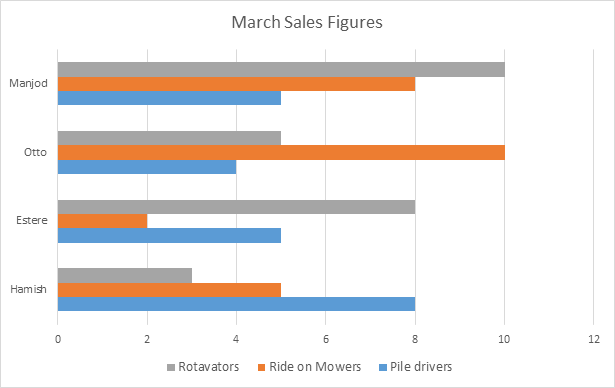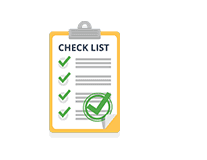The Expert Guide to Numerical Tests (+ Practice Tests + 5 Top Tips to Pass Every Time)
Updated November 26, 2024

- What Are Numerical Reasoning Tests?
- What Are Numerical Test Questions Like?
- Try a (10 Question) Practice Numerical Test
- What Level of Maths Is Required for Numerical Tests?
- Different Types of Numerical Test
- The 2 Ways to Take a Numerical Test
empty
empty
- How Do You Know What Type of Numerical Reasoning Test You Are About to Take?
- Numerical Tests: Our Top 5 Tips
- On the Day of the Test...
- Taking Online Numerical Tests
- What To Do Next? Further Practice!

Numerical Reasoning Tests can be very tricky.
And when it comes to results, preparation and practice are key.
But that's easier said than done.
If you're researching this type of aptitude test for the first time or if you want to improve your numerical ability, perform better on tests and get more job offers this article will provide some practical strategies that you can use immediately.
So...
For the best chance of success, read the article below slowly, work through the example questions, follow our tips and actionable advice and then start taking practice tests.
Ready to get started?
Let's go!...
Want to try a practice test before reading this article?
You can take our free numerical test right here:
This test has 10 questions and should be completed within 10 minutes.
Answers with full explanations are provided after each question.
Quick Announcement (Affiliate Disclaimer) Please Read!:
-
We promote a website called JobTestPrep in this article. We believe JobTestPrep offer the very best online coaching for candidates like you, taking aptitude tests.
-
Their website offers 100's of practice tests and 1,000's of questions, including answers and full explanations, designed to help you improve as quickly as possible.
-
You can find out more about their expert paid numerical test practice right here or visit the main page of their website.
-
They also offer some free resources: a free numerical reasoning test is available here.
-
We believe JobTestPrep is a great tool because they offer so many different types of tests including exact match simulator tests designed around the real tests specific companies are using.
-
They also offer a no questions asked 100% full money back guarantee on every purchase.
What Are Numerical Reasoning Tests?
Numerical reasoning tests are tests of numerical ability.
They require you to work out the answers to number based problems, often within a time limit.
These tests can include questions on:
- Percentages
- Sequences
- Ratios
- Data interpretation
- Currency conversion
- Financial analysis
Employers frequently use numerical reasoning tests to assess the numeracy of candidates they are interviewing for a job.
Tests are usually given as an online test after your initial job application or as a real life test given during an interview or assessment day.
Companies will often combine numerical tests with another test type, such as Verbal Reasoning Tests, Logical Reasoning Tests or Situational Judgement Tests.
What Are Numerical Test Questions Like?
Most numerical test questions are based on a snapshot of numerical information or statistical data.
This snapshot of information often includes tables, graphs or charts.
To complete these tests and score highly you must answer a series of multiple-choice questions.
To find an answer to each question you will need to work on the data provided in each question.
These types of question are designed to mimic the real life numerical manipulation people will be asked to do in their day to day work.
Here comes an example numerical test question...
Take a look at the following Sales Figures for March and then answer the questions below.

Price List:
- Rotavators = £120
- Ride on Mowers = £400
- Pile Drivers = £380
Question:
Which member of the Sales Team had the highest total sales value in March?
a) Manjod
b) Otto
c) Estere
d) Hamish
This test has 10 questions and should be completed within 10 minutes. Answers with full explanations are provided after each question.
What Level of Maths Is Required for Numerical Tests?
Numerical reasoning test questions can be very hard or very easy, depending on your test.
Companies that require employees to have very good numeracy (for example: banks and accountancy firms) usually use tests with harder questions.
But, most of the time, the questions in numerical reasoning tests will be at a high school (US) or secondary school (UK) level.
You can expect questions to involve:
- Data manipulations and calculations
- Basic arithmetic
- Percentages
- Fractions
- Ratios
- Estimates
You should also expect to be asked questions relating to time, currency and measurements.
If you are unfamiliar with these concepts or have not used them recently, refresh yourself with them before you take a test.
Calculators are usually allowed in numerical tests (although this is not always the case).
Check before you take your test!
Different Types of Numerical Test
Broadly speaking numerical tests fall into one of two categories:
- Tests of speed
- Tests of power
Both aim to put candidates under pressure to see how well they perform but the way in which they do so is different.
Tests of speed assess how many questions you can correctly answer in the given time period.
If you had unlimited time you could probably get through all of them, but within the time limit your calculations must be performed extremely quickly to be able to complete the test.
In fact, these tests are designed so that even the smartest person would be unlikely to answer all of the questions.
Tests of power are more complex; they assess the level of question difficulty a person can cope with.
Such tests typically have an ample time limit and questions that increase in difficulty throughout the test.
Some tests use elements of both speed and power; they have questions of rising difficulty within a challenging time period.
The 2 Ways to Take a Numerical Test
There are two ways you can approach a numerical reasoning test:
1. You Can Rush Through the Test Completing as Many Questions as Possible
When you come to a question you’re not sure about you can either skip it, or give your best guess and move on.
2. You Can Focus On Accuracy and Spend Time Checking Your Answer Is Correct Before Moving on to the Next Question
Where you come across a question you’re not sure about you stick with it until you’re confident you’ve solved it.
So...
Which strategy is best?
This definitely depends on what type of test you’re completing.
For a speed test it makes a lot of sense to keep moving forwards and not waste time on questions you’re not sure about.
You can usually come back to questions you're not sure about at the end of the test.
But there’s no point in rushing through a test and getting all of the answers wrong.
Use your best judgement to pick the answer you think is correct at the time.
The main problem with this quick approach to answering questions comes with tests of power where accuracy is essential and getting an answer wrong can end the test.
In the latest wave of numerical reasoning tests, so called ‘Adaptive Tests’, specially designed test software tailors the difficulty of each question depending on the candidate’s previous answer.
This means that the questions rapidly get harder and harder until the person gives a wrong answer.
In some tests, getting a single wrong answer can mean not progressing any further with the test.
Clearly in such tests focusing on accuracy and spending time checking you’ve selected the answer you intended to is a sensible approach.
How Do You Know What Type of Numerical Reasoning Test You Are About to Take?
Choosing your strategy is dependent on correctly identifying whether you are completing a test of speed, power, or a hybrid of both.
So...
How can you tell?
If you can find out in advance what type of test you’re taking then obviously that’s helpful, and some organisations may be willing to tell you in advance what type of test and even which test publisher you will be using.
When psychometrics are to be completed online, in advance of assessment days, you will generally be able to see from the email link which tests you’ll be doing and you can check on the test publishers website to find out more.
The British Psychological Society also has information about psychometric tests that you can use in your research.
Take a look too at our own extended expert guide on Psychometric Tests.
If you can’t find out in advance which test type you will be sitting there may be some clues you can look out for on the day:
- Paper tests cannot be adaptive.
- Tests with very short time periods for completion are typically speed tests.
- Power tests typically require more numerical reasoning (i.e. thinking through problems and applying calculations to the problem) than straightforward computation.
- Check the test instructions, there may be a clue in here.
Whatever strategy you choose remember that getting questions correct is what really matters.
Ensure that you are giving yourself the best chance you possibly can by working quickly but accurately and taking the time to check your answers.
Numerical Tests: Our Top 5 Tips
Aptitude tests are popular with employers because they are an easy way to compare candidates and test intelligence.
To perform better than most other candidates and score results in the top percentile, you must have excellent numerical skills.
So make sure you prepare and practice before your test!
Here are 5 top tips for anyone about to take a numerical test:
Step 1. Take Practice Tests
Do this and you will become much more familiar with the format and types of questions you will be asked during your tests.
Practice will highlight any gaps in your knowledge you might like to revise and will help you manage your nerves because you know what to expect when it comes to the real thing.
100's of practice tests are available from JobTestPrep (you can take a free numerical test on their website here).
Step 2. Find Out Which Company is Providing the Test
Doing this will enable you to look at the test provider's website and find extra useful information specific to their tests.
You will also be able to find practice tests specific to this provider.
Some notable providers are SHL and Kenexa.
Step 3. Get Plenty of Sleep
Your test will be very demanding and require short bursts of concentration.
You are more likely to perform at your best if you get plenty of sleep the night before your test.
Step 4. Give Yourself Plenty of Time to Get to the Test Centre
Running late will increase your stress levels and this may have a detrimental impact on your performance.
Step 5. Try to Relax
It is natural to experience nerves and anxiety in before and during a test.
It can be helpful to take deep steady breaths and try to keep the test in perspective.
On the Day of the Test...
When you arrive at the test centre you may be given a series of instructions by the administrator.
Listen to these instructions carefully because you will only be told once.
Often at the beginning of the test, the administrator will read the instructions to you while you read them from your test paper.
This is to make sure that all candidates have received exactly the same information.
Don’t read ahead because you may overlook a crucial piece of information.
Once the instructions have been read, you will have the opportunity to ask any questions.
If there is anything that you are not too sure about or you would like something clarifying always ask.
You will not be assessed in any way for asking.
Before you begin the test you will usually have a chance to complete a couple of example questions.
These are frequently provided in the instructions section and are provided to help you familiarise yourself with the format.
The example questions are not completed in timed conditions and they don’t form part of your final test result.
Applicants are also provided with the answers to these questions before you begin the real test.
This is useful because if you get a question wrong it is a great opportunity to ask why, learn from it, and not make the same mistake in the actual test.
Taking Online Numerical Tests
Many employers are now phasing out the traditional paper test in favour of online aptitude tests instead.
The majority of the strategies that you will use for a paper test are the same for an online test, but there are a number of additional points to also consider:
Set yourself up for success by making sure that you have a suitable place to take the test.
This should be somewhere quiet and free from distractions, where you will not be disturbed.
Turn off anything that might distract you (e.g. your phone) and disable any notifications that might pop up during the test (e.g. email notifications).
It is useful to warn people around you that you do not want to be disturbed and it may even be worth putting a ‘Do not disturb’ notice on the door of the room you are in.
Check that your computer is working before taking a test.
You should also check that your internet connection is sufficient for the test (check requirements with the recruiting company) and that your browser is up to date.
The last thing that you need is to get halfway through the test and find that you have lost your connection.
Check any browser security measures which can sometimes block certain features of the test.
Remember that popup blockers and firewalls can often block important information.
Some people may be tempted to try to cheat on online tests, by getting someone else to complete it on their behalf for example.
Recruiting organisations are aware of this risk, and to ensure that the test score genuinely reflects the candidate’s ability they will validate the test results with a retest under controlled conditions i.e. with someone watching them.
This means that there’s very little point in trying to cheat because unless you can pass the numerical reasoning test yourself, you will be caught out at the validation stage and waste a lot of time for yourself and other people.
What To Do Next? Further Practice!
Preparing for any kind of aptitude test can be daunting.
Your test may be in less than 48 hours and you may feel unprepared.
There is one thing that sets apart successful candidates and unsuccessful ones and that is practice.
The best thing you can do is to take practice questions that are similar to the questions you will be given in your real tests.
The more practice questions you take, the more you will understand how:
- to find the right answers
- to spend the right amount of time on each question (speed is very important on timed tests)
- to watch out for questions that have been designed to trick you!
We recommend a website called JobTestPrep for candidates who would like to prepare as well as possible, as quickly as possible, for their tests.
There are many aptitude test preparation websites available, but JobTestPrep offers the widest range and highest quality of test questions, for a reasonable price.
You can find out more about them, and how they compare to other websites in our full comparison and review article here.
If you don't have time to read that article, here's a simple comparison table:
| Job Test Prep | Assessment Day | Practice Aptitude Tests | |
|---|---|---|---|
| Range of tests | Extensive | Limited | Limited |
| Price of package | £49 | £39.99 | €39 |
| Length of access | 1 Month | Unlimited | 1 Year |
| Money back guarantee | 30 days | None | 30 days |
| Customer service | Great | Good | Good |
| Free trial tests | Yes | Yes | Yes |
| Multilanguage | Yes | No | No |
| Our review | 5/5 | 4/5 | 4/5 |











